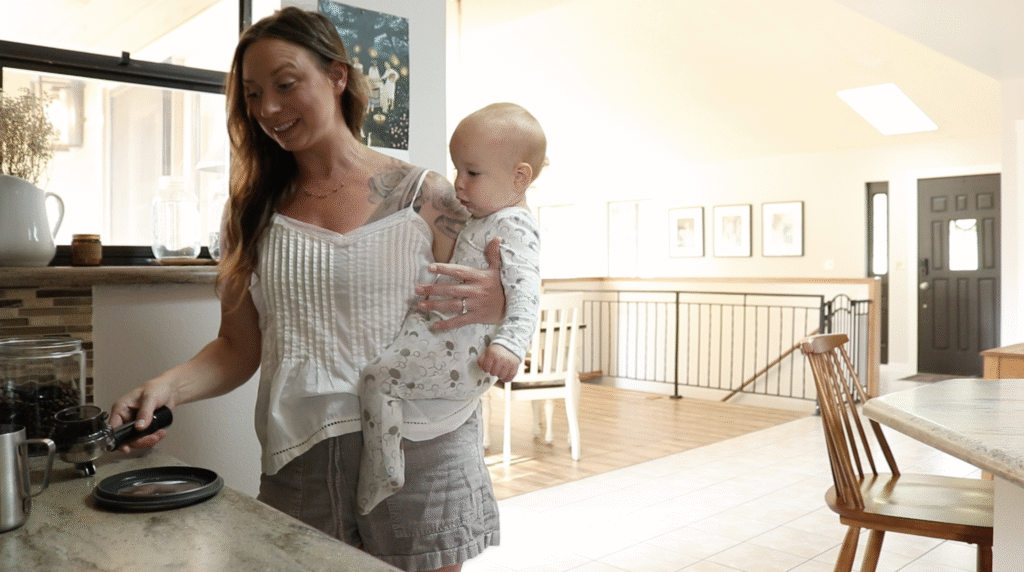How I Healed from Burnout as a Christian Mother
Do you ever catch yourself acting irritable, or harsh, or snappy all the time and for no apparent reason?
Always rushing your kids along without really knowing why? Talking fast, walking fast, or driving fast… and you’re not even late for anything?
That was me for years. I lived in a constant state of urgency—always multitasking, always frantic, always overwhelmed and irritable. Until one day, I realized: I wasn’t just stressed. I was burnt out.
I knew I needed a break, but I was at the point where no amount of free time would be enough. I needed healing.
Sometimes we stay in this frantic, irritable state—not because we’re actually upset about anything, but because we’ve emotionally committed to the role. The longer we act irritable, distant, harsh, frantic the more momentum it gains, and stopping suddenly feels jarring or even vulnerable. Rather than face the discomfort of inconsistency or admit, “Maybe I didn’t need to respond that way,” we double down to protect our pride.
Over time, that repeated emotional posture gets internalized—we stop seeing it as a temporary state and start believing, “This is just who I am.” And the tragedy is, we don’t even realize we’ve been performing and that’s actually not who we are. We just forget how to stop.
So, in this post, I’m going to walk you through exactly how I began to change and actually heal from burnout as a Christian mother—everything from healing my nervous system, to rewiring my brain on certain topics that were leading to the burnout, to breaking free from perfectionism and hurry sickness.
Burnout Is Not Your Destiny
I truly believe burnout is one of Satan’s favorite tools for stealing a mother’s joy. It robs our energy, blinds us to beauty, and convinces us we’re failing. And this term has become normalized—mom burnout—to the point where moms are just accepting it like a rite of passage. That needs to change.
With the Lord’s infinite mercy, you can escape survival mode. I know this because I lived it and overcame it as well. I’ve come out the other side where I’ve experienced joy and peace even though my circumstances didn’t change.
If you’re a Christian mother who is feeling burnt out and longing to be the joyful mother and wife you always imagined—without turning to expensive therapy, supplements, or constantly decluttering your home—you don’t have to stay stuck in survival mode.
Frantic Isn’t Your True Nature—It’s Just What You’ve Rehearsed for Too Long

We confuse the pace we’ve maintained with the person we’ve become. But being constantly rushed, snappy, and tense isn’t who you are—it’s just what you’ve practiced. And the good news? You can practice something new.
I used to do everything at warp speed. I actually used to pride myself on my ability to get so much done in a day. I was constantly breaking things, rushing my kids to go go go at my pace.
And now? I’ve slowed way down. I get less done in a day—but I feel so much more peace.
There’s a term for this chronic sense of urgency—it’s called hurry sickness. And while it’s not a medical diagnosis, it’s very real. It’s that sense of always being behind, always rushing, always carrying urgency in your chest—even when there’s no need.
And that’s not from God.
I once heard someone say, “You can either rush with Satan or walk with God.” God is methodical. He doesn’t rush. Satan is a taskmaster, and he wants to see moms hurrying their children out the door, missing connection and discipleship. All of that is so far from the peace the Lord offers.
So if you feel that looming pressure to just go faster, consider the recognition of that as a nudge from God to slow down.
That recognition will come at shockingly inconvenient times. Like when you’re running late for something important and you’ve spent the whole morning rushing your children along in a frantic state and suddenly it dawns on you: You’ve been acting like a basket case all morning.
It’s as if the frantic energy has taken on a life of its own. Not because it is who you are… but because it’s a pattern you’ve rehearsed for so long. And if you don’t interrupt that pattern—it starts to become your default.
So when you become made aware of that frantic energy, make the vulnerable decision to put down that character—let it be abrupt—let it be weird. Your family might say something, and that’s fine—just apologize and move on.
Remind yourself: This isn’t who I am—this is just who I’ve practiced being. And I can practice something new.
The Lie of Perfectionism Leads to Burnout

If hurry sickness is the fuel behind our frantic living… perfectionism is the engine that keeps it running.
And the deeper you trace it, the more you’ll realize—it’s not just about clean counters or matching outfits. It’s about something far more dangerous.
Do you tend to hold yourself—and others—to excessively high standards?
This trait can make you capable and dependable… but it can also leave you anxious, irritable, and disconnected.
Perfectionism often begins as a survival mechanism—especially for those who’ve lived through immense childhood trauma. And while it may have once served a purpose, it no longer serves you.
Perfectionists tend to struggle to feel joy. I can say this because I used to be one. We can’t relax. We redo what others have helped us with. We think if I want anything done ‘right’ I have to do it myself.
But God never asked us to be perfect—He sent His Son to be perfect in our place, so we could walk in grace, not performance.
Perfectionism can be a sign of pride—leading us to think that the blessings in our lives are as a result of our own doing versus attributing the cause of the blessings to the Lord.
Why do we so often fall into the trap of thinking that in order for our work to be seen as good and beautiful, things have to be perfect—or done OUR way?
What if God sees the mess—the toys everywhere, the half-finished laundry, the tough chicken and undercooked beans—as beautiful?
What if connecting with your husband emotionally, laughing at the chaos, and taking time to disciple your children is actually the goal?
Replacing Perfectionism With Peace

Life is so much sweeter when we let go of the little things, let the unimportant things fall by the wayside, and realize that there’s a season for having a perfect home, or the perfect fitness routine, or a perfect diet.
Philippians 4:8 says,
“Finally, brothers, whatever is true, whatever is honorable, whatever is just, whatever is pure, whatever is lovely, whatever is commendable—if there is any excellence, if there is anything worthy of praise—think about these things.”
But this can be so difficult when you’re in this state of destructive perfectionism, can’t it?
So just for grins, let’s see if we can put the next few tips into practice this week and see how it blesses our lives.
Tips to Break Free From Perfectionism:
- Allow others to help you
Resist the temptation to correct the job they do, and understand that if something isn’t done right, the repercussions probably aren’t worse than the repercussions of a perfectionistic mindset. - Be perfectionistic about joy
Use your perfectionism to your advantage—get really perfectionistic about self-care activities. Eat dark chocolate while reading a book for pleasure. Work several of these into your day. - Attribute your success to Christ
This is both freeing and empowering. Remembering who your provider is will free you from the bondage of perfectionism. - Slow down
Focus on the simple joys—like hot coffee with your husband on a slow Saturday morning, a hilarious conversation with your toddler, or a sweet moment with your infant.
This isn’t about becoming lazy. It’s about giving yourself grace.
Beyond the Surface: Real Transformation Requires More Than Tips

Maybe you’ve made lots of changes—you’ve decluttered your home, started waking up earlier for quiet time, tried new routines.
You’ve put in the effort, and maybe you even felt a flicker of hope.
But if you’re still wondering why your mornings feel rushed, why your tone still comes out sharp, why your evenings carry that heavy weight of guilt… and you feel stuck in the endless cycle of “just surviving the day,” wondering if true change is even possible—then you need more than tips and tricks.
You need a system. A way to actually rewire how you think and respond.
Healing Your Nervous System
When I first realized my nervous system was stuck in “fight or flight,” it changed everything. I thought I was just stressed or tired, but the truth was deeper.
So how do you begin to heal a nervous system that’s stuck in chronic stress?
- Notice your body
Pay attention to tension in your neck, shoulders, or chest. Recognize the racing thoughts or the impulse to snap at minor things. - Introduce calm
Use tools that tell your nervous system you’re safe—you don’t need to freak out. - Rewire your brain
Change the way you talk to your body, talk about your life and situations. Renew your mind.
Healing isn’t a one-time fix—it’s daily choices and mindsets that help your body learn peace again.
Mindset Shifts That Restore Peace

Reframe Your Role
You’re not just serving your family. You’re serving the Lord.
Colossians 3:23:
“Work heartily, as for the Lord and not for men.”
Always Be a Blessing
How can I be a blessing to my family today?
Proverbs 11:25:
“Whoever brings blessing will be enriched, and one who waters will himself be watered.”
Homemaking Is Your Career
Treat homemaking with ambition, excellence, and leadership. Whether full-time at home or balancing a job outside, your leadership at home matters.
What Will Your Children Remember?
After the noise quiets and the bedtime stories fade, what will remain is the atmosphere you cultivated—the invisible warmth that wrapped around their earliest years.
So zoom out.
When you’re tempted to lash out or spiral, picture your child twenty years from now. What do you want them to remember about today?
That little practice keeps my heart soft, my tone gentle, and my eyes fixed on the bigger picture.
Step Into the Peace That’s Already Yours
You can heal from burnout. You can build a peaceful, joyful home even without changing your circumstances.
If you’d like a catalyst for this kind of transformation, I walk through it all inside my free workshop.
It’s always such a joy to have you here!







